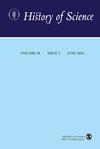后记:科普、独裁和民主
IF 0.8
3区 哲学
Q2 HISTORY & PHILOSOPHY OF SCIENCE
引用次数: 0
摘要
本文是《佛朗哥统治下的西班牙科普专题》的后记,从个案研究中得出一般性结论。最重要的是,不同的贡献表明,大众化存在于这个独裁政权之下,因此不需要哈贝马斯式的自由民主公共领域。作者还总结了四个更具体的教训,每一个都对科普或独裁政权提供了新的启示。大众化不仅是促进科学发展的一种方式,而且还被用来通过将独裁政权与科学事物联系起来来支持独裁政权。(2)极权主义政权远没有表面上看起来那么铁板一块;他们往往隐藏着内在的弱点和冲突。(3)对独裁统治下的科学普及的研究可以帮助我们了解民主国家中类似的宣传形式。(4)极权主义最好不是作为一种普遍现象来理解,而是在其特定的历史情境中理解。研究佛朗哥统治下的科学普及,可以发现这个政权的具体特征:内战的遗产、西班牙的地方主义以及佛朗哥统治下的国家对国际的依赖。本文章由计算机程序翻译,如有差异,请以英文原文为准。
Afterword: Science popularization, dictatorships, and democracies
This Afterword to the special section on Science Popularization in Francoist Spain draws general conclusions from its case studies. Most overarchingly, the different contributions show that popularization existed under this dictatorial regime, and hence does not require a Habermasian liberal-democratic public sphere. Four more specific lessons are also drawn, each shedding new light on either science popularization or dictatorial regimes. (1) Popularization has not only been a way to promote science, it has also been used to prop up dictatorial regimes by associating them with things scientific. (2) Totalitarian regimes are much less monolithic than they appear to be at the surface; they often harbor internal weaknesses and conflicts. (3) The study of science popularization in dictatorships can help open our eyes for comparable forms of propaganda in democracies. (4) Totalitarianism is best understood not as a universal phenomenon, but in its specific historical situatedness. Studying science popularization under Franco brings out the specific traits of this regime: the legacy of the Civil War, Spanish regionalism, and the international dependencies of the Francoist state.
求助全文
通过发布文献求助,成功后即可免费获取论文全文。
去求助
来源期刊

History of Science
综合性期刊-科学史与科学哲学
CiteScore
1.50
自引率
0.00%
发文量
15
审稿时长
>12 weeks
期刊介绍:
History of Science is peer reviewed journal devoted to the history of science, medicine and technology from earliest times to the present day. Articles discussing methodology, and reviews of the current state of knowledge and possibilities for future research, are especially welcome.
 求助内容:
求助内容: 应助结果提醒方式:
应助结果提醒方式:


